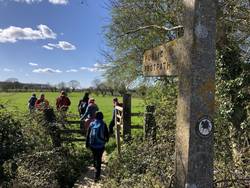Well, it might be a bit of an exaggeration - it’s not like we’ve been locked inside for the last 3 months – but the April loosening of Covid restrictions has felt like a taste of freedom. It’s been refreshing going for a walk that isn’t from your front door. Much as I love Saffron Walden, there really isn’t a path I haven’t walked in the last year and even a short hop down the road to Thaxted seems like an expedition akin to the deep Amazon.
If the change of scenery wasn’t enough excitement, we have also been meeting up with real live people. After all these months speaking to people through the letter-box squares of Zoom, it is so nice to have proper rambling conversations with no one talking over anyone or forgetting they are on mute.
This evening we even made it to the pub for our first draught beer of 2021. I have really missed pubs! So many of our lockdown walks would have been perfect if we could only have had a little drinkie half way round to ease ourselves into the return leg.
Hopefully, if we can manage to stay on Boris’ road map, the next step will be a trip up north at the end of May to see actual hills. You remember those? The things that make you puffed and red in the face, but seem to lay the whole world at your feet. I’m definitely up for that.
Ali
In the Footsteps of Dick Turpin
On Easter Monday I led a walk from Thaxted taking in loops 2 and 3 of the Turpin trail. The trouble was that I was so engrossed in operating an organsied sporting activity and not getting lost, I never got round to telling everyone about the local bad boy the route was named after. Oops.
Dick was born in the Hempstead in around 1706, where his dad was the landlord of the Bluebell Inn. After a fairly ordinary childhood, he was apprenticed to a butcher in Thaxted – allegedly Duckett’s which is still there – married and moved into the village. It was at this time that Dick fell into bad company. It seems likely that the local poachers needed a butcher with flexible morals. After the poaching gang got rumbled it seems Dick graduated to brutal house invasions with a new gang, until they were sold out by one of the junior members in 1735. This led to a number of arrests and hangings, and the survivors went into hiding around Epping Forest. It’s at this point, in the last 4 years of his life, that Dick turned to the trade he is best known for – highway robbery!
Dick teamed up with Matthew King and they robbed across north London and Essex until one fateful night in 1737 when they encountered a victim who was armed and fought back. In the resulting melee it seems like Dick accidentally shot Matthew. Dick then went into hiding in Epping Forest, but was recognised and killed the witness in his haste to escape. After this second killing a sizeable reward of £200 was placed on his head.
With Essex now too hot for him, Dick journeyed north. Not the fabled ride from London to York on Black Bess, which was made up afterwards. He just quietly re-appears in York under the name of John Palmer. But he doesn’t stay quiet for long. He manages to get into a fight with a man in the street and is sent to jail in Beverley. Further enquiries revealed that John Palmer was wanted in Lincolnshire for horse stealing, so he was transferred to York Castle.
From jail, Dick wrote to his brother-in-law in Hempstead, but the brother-in-law refused to pay for the postage and the letter was held at Saffron Walden post office. Here his handwriting was recognised by the postman, a former tutor, and his true identity revealed. Despite killing two people and brutalising many others, it was the stealing of the Lincolnshire horses for which he was tried and eventually hanged in 1739.
There’s not much in the real story to explain how Dick later became a romantic legend. It seems this was all cobbled together by 19th century author William Harrison Ainsworth from tales of other highwaymen mixed with a hefty dose of fiction to make a Robin Hood for a new age. Still, why let truth get in the way of a good story.
Ali
